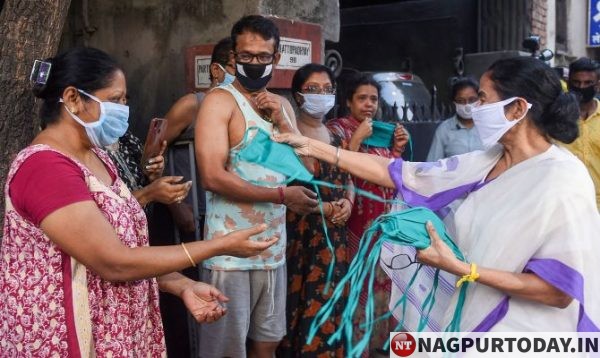Hinting that lockdown might continue, West Bengal Chief Minister Mamata Banerjee announced a slew of relaxations on Friday, including reopening of shrines from June 1 and functioning of state government offices with 70 per cent staff in attendance from June second week.
The announcements, two days before the end of the fourth phase of the lockdown, aimed to normalise the day-to-day functioning of major institutions, did not go down well with the Bharatiya Janata Party and the Communist Party of India-Marxist, who sought a rethink over the decision as the state was witnessing a spike in the number of coronavirus cases.
Banerjee, who had earlier declared restarting of private and public sector offices with full attendance from June 8, later in the evening came out with a statement by saying state government offices, will function with 70 per cent workforce, whereas the private sector would take a call on its own.
In a statement on her Facebook page, Banerjee said the “rest of the lockdown will continue with needful impact”.
West Bengal became the second state to throw open the doors of the shrines for devotees after Karnataka, which has sought permission from the Centre to reopen religious places from Monday.
However, Banerjee made it clear that no congregation and not more than 10 people would be allowed at a time at religious places in the state. She also announced full operationalisation of tea and jute industries — the state’s economic backbone.
Hitting out at the Railways for sending trains jam-packed with migrant workers by completely disregarding social distancing norms, she wondered whether the Railways was running “corona express trains instead of Shramik Special trains”.
“I have come to know that the railways is sending trains jam-packed with migrant labourers. In one seat, three-four persons are travelling for 48 hours to 72 hours.
“So I thought then what is the harm in opening up religious places. From June 1, temples, mosques, gurdwaras and other shrines and religious places can open up in Bengal. But there would be no major
congregation or celebration of any festival,” Banerjee said.
The shrine committees will have to take responsibility regarding precautionary measures and sanitising the premises, she said.
All shrines and religious institutions, including Kalighat and Dakisneshwar temples, St Paul’s Cathedral and Tipu Sultan Mosque, were closed for the last two months due to the coronavirus-triggered lockdown.
Claiming that the state was able to control the spike in the number of cases for the last two months, Banerjee blamed the influx of people as one of the main reasons behind the increase in the number of cases.
“We were successful in controlling the spread of COVID-9 in last two months, but now it is increasing as a lot of people are coming from outside. The Railways is sending migrants in jam-packed compartments.
“We are paying for 235 trains but then why are two to three people being made to sit on one seat? The railways in the name of Shramik Special trains are running ‘corona express’ trains,” the TMC chief said.
Banerjee said that since she has been the railway minister in the past, she is aware that the railways can run extra trains or add coaches to ensure proper social distancing among migrants on board.
“Most of these workers are coming from hotspot states such as Maharashtra, Gujarat, Tamil Nadu and Delhi. Why can’t the Railways run extra trains so that social distancing is maintained. No food, no
water… the migrants are being packed inside trains, sometimes double the capacity,” she said.
“Many of them have died due to lack of food or water. People are scared,” Banerjee said and wondered why the Railway is not allowing more trains for migrant workers.
The number of COVID-19 cases is increasing because of this. The railways has some social obligation; they cannot operate based on profit and loss, she said.
Her comments came a day after the state registered the highest single-day spike with 344 new cases of COVID-19 infection, taking the total number of cases to 4,536.
Buses, which till now we’re allowed to ply with only 20 passengers, will now be allowed to run with full seat occupancy, she said.
However, schools would remain shut all through June as those were being used as quarantine centres for the migrants returning home.
“All the tea gardens and jute mills can function at full strength. Public and private sectors could start functioning with full attendance from June 8,” she said.
But later in the night, she came out with a statement and said it has been decided to increase state government workforce capacity from 50 per cent to 70 per cent.
“In the private sector the prerogative lies with the respective managements of private entities to decide on workforce capacity and act accordingly… Rest of the lockdown will continue with needful impact,” the statement said.
Reacting to Banerjee’s announcements, the BJP’s West Bengal unit president Dilip Ghosh said the decision to reopen religious sites might backfire as coronavirus cases were rising every day.
“We don’t think this is the right decision by the state government. Who will ensure that only 10 people are entering the shrines at a time? Will there be police posted? I think the state government should rethink, as the number of cases is rising every day,” he said.
CPI-M politburo member Mohammed Salim said the state government was trying to take populist measures by risking the chances of spreading of the virus.














